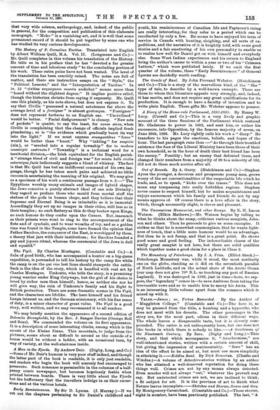The History of P. Cornelius Tacitus. Translated into English by
Albert William Quill, M.A. Vol. II. (Longmans and Co.)— Mr. Quill completes in this volume his translation of the History. He tells us in his preface that he has "devoted a far greater amount of time and laborious study" to the concluding portion of his work. These extra pains have not been wasted. The level of the translation has been sensibly raised. The notes are full of matter, and there are instructive essays on the "Style," the "Political Lessons," and the "Interpretation of Tacitns." In iv. 12 " civitas neguaguam maesta audiebat" means more than "heard without the slightest degree." It implies positive relief, though the historian shrinks from saying it expressly. Mr. Quill sees this plainly, as his note shows, but does not express it. To say that Civilis "possessed a natural astuteness far above the average level of a foreigner" is almost grotesque. "Foreigner" does not represent barbarus to an English ear. " Uncivilised " would be better. "Facial disfigurement" is clumsy. "New sets of pockets" is quaint, to say the least, for novos sinus, when Civilis is complaining that the change of officials implied fresh plundering; so is "the evidence which gradually burst its way into the light." If we must express erumpentibus " force " would be better than "burst." Why "inkling" for suspicio (six.), or "erected into a regular township" for in modum municipii ezstructa " Township " is a technical word for a territorial division,—the Irish equivalent for the English parish. A "strange blend of civil and foreign war" for mizta belli civilis ezternigue facie ludicrously suggests a blend of whiskey. The fact is that Mr. Quill has but an indifferent command of his own lan- guage, though he has taken much pains and achieved no little success in ascertaining the meaning of his original. We may give as a specimen of his work a continuous passage from v. 5:—" The Egyptians worship many animals and images of hybrid shapes, the Jews conceive a purely abstract ideal of one sole Divinity ; they regard as profane those who mould from mortal stuff the statues of the gods in human shape, and they believe that their Supreme and Eternal Being is as inimitable as it is immortal. Accordingly they set up no images in their cities, still less so in their temples ; no such flattery as this do they bestow upon Kings, no such honour do they confer upon the Ctesars. But, inasmuch as their priests were wont to sing to the accompaniment of the flute and of cymbals, and to wear wreaths of ivy, and as a golden vine was found in the Temple, some have formed the opinion that Father Bacchus, the conqueror of the East, is worshipped by them, a theory that jars with their institutions ; for Bacchus founded a gay and joyous ritual, whereas the ceremonial of the Jews is dull and squalid."


















































 Previous page
Previous page